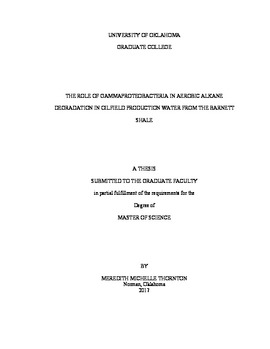| dc.description.abstract | Despite nearly a century’s worth of research focused on investigating the activities of microorganisms in petroleum production systems, a large gap in the literature exists on the role of heterotrophic microorganisms in petroleum-impacted systems. This study aimed to review the current literature examining the major topics in petroleum microbiology while also contributing new findings towards understanding how heterotrophic bacteria, especially members of the Gammaproteobacteria, function in instigating hydrocarbon degradation and downstream biocorrosion in petroleum production water. Several isolates were obtained from the petroleum production water, examined for hydrocarbon degradation ability, and identified via 16S rRNA gene sequencing. One isolate, Halomonas (Gammaproteobacteria) A11A completely oxidized C5 n-pentane and C10 n-decane and partially oxidized C16 n-hexadecane and toluene as estimated through oxygen respirometry. Whole genome sequencing of A11A revealed it possesses an alkane monooxygenase (alkB) and also contains pathways for complete oxidation of n-alkanes and incomplete oxidation of aromatic hydrocarbons (BTEX). Fifteen additional heterotrophic isolates were identified via 16S rRNA ribosomal gene sequencing as Arcobacter (7 isolates, Epsilonproteobacteria), Thalassospira (5 isolates, Gammaproteobacteria), Marinobacterium (2 isolates, Gammaproteobacteria) and Salinicola (1 isolate, Gammaproteobacteria). One strain each of Arcobacter and Marinobacterium were tested for growth on hydrocarbons. The Marinobacterium strain showed moderate growth, but the Arcobacter strain was unable to grow on any of the hydrocarbon substrates. However, Arcobacter species contribute to biocorrosion by the oxidation of sulfide. Other studies have found that Thalassospira and Salinicola strains can degrade polyaromatic hydrocarbons. Collectively, these findings suggest that aerobic heterotrophs, such as Gammaproteobacteria, could contribute to biocorrosion by providing substrates, fully and partially degraded hydrocarbons, which foster the activities of sulfidogenic and fermentative microorganisms. Here, we propose that the underappreciated, seemingly innocuous, and often ignored general heterotrophs be considered as problematic and be monitored more closely since they can indirectly threaten the integrity of production water systems. | en_US |
